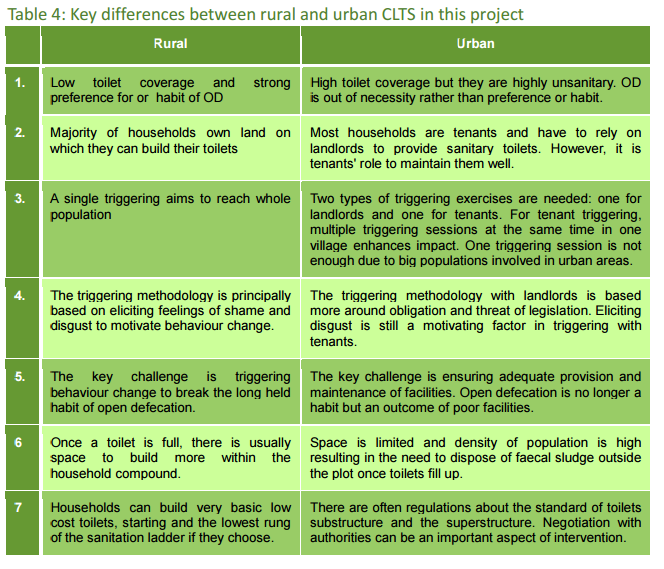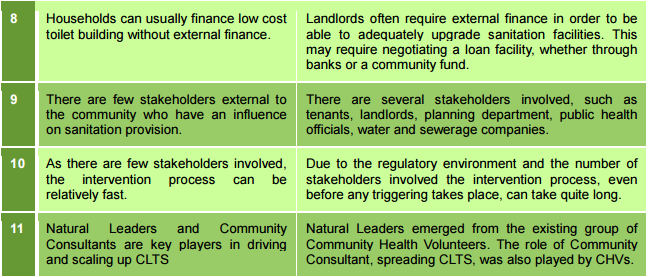- Forum
- categories
- Attitudes and behaviours
- Community-led approaches
- CLTS (Community-led total sanitation)
- What are your thoughts on urban CLTS? Can it work?
What are your thoughts on urban CLTS? Can it work?
25k views
- JamieMyers
-
 Less
Less- Posts: 13
- Karma: 2
- Likes received: 11
Dear All,
Here is a paper I wrote for the WEDC conference in July on Urban CLTS. I have also attached the presentation slides.
Questions that came up after, focused on what can CLTS bring to the urban environment. I think what it can do is help trigger, raise awareness and unify the demand for sanitation. Other players will have to be involved in the process but it can mean that communities are given a equal voice and not just been seen as a group of people who need to be consulted.
It is something that I am continuing to document and think about and would appreciate any constructive criticism and comments.
Here is a paper I wrote for the WEDC conference in July on Urban CLTS. I have also attached the presentation slides.
Questions that came up after, focused on what can CLTS bring to the urban environment. I think what it can do is help trigger, raise awareness and unify the demand for sanitation. Other players will have to be involved in the process but it can mean that communities are given a equal voice and not just been seen as a group of people who need to be consulted.
It is something that I am continuing to document and think about and would appreciate any constructive criticism and comments.
This message has attachments files.
Please log in or register to see it.
The following user(s) like this post: Elisabeth
Please Log in to join the conversation.
You need to login to reply- Elisabeth
-
Topic Author
- User is blocked
- Freelance consultant since 2012
Less- Posts: 3372
- Karma: 54
- Likes received: 932
Re: CLTS - urban vs rural
Hi Joe,
Thanks for bringing this report to our attention. I have moved it into this existing thread where we discussed "urban CLTS" in the past.
Also, let me copy here some key pieces from the report so that it can be found more easily with keyword searches:
+++++++++++
Executive summary:
Community Led Total Sanitation (CLTS) is an innovative methodology for mobilising communities
to completely eliminate open defecation (OD). It has been applied in many rural areas in countries
across the developing world. However, experience in urban settings has been limited. Practical
Action and Umande Trust have implemented a project Realising Rights to Total Sanitation in two
low income settlements in the city of Nakuru, Kenya, adapting the CLTS methodology to meet the
challenges of the urban context. This has involved devising a triggering exercise with landlords as well as tenants and using theatre to attract and sustain interest during community triggering.
Working in an urban area has required considerable attention to designing, through a participatory
process, low cost toilets that meet urban public health and building regulations.
The project has taken steps to address wider issues of faecal sludge management, solid waste
management, access to clean water, and waste water management. It has worked with lending
institutions to assist landlords in accessing the necessary finance to upgrade their facilities. It has also trained and supported government staff to ensure that the processes carried out in this project can be replicated and taken to scale within the county of Nakuru. The project has achieved much of its success through effective coordination and collaboration not only with the County Government Health Department, but with a range of other stakeholders at the local, county and national level.
Whilst the project has largely been successful in facilitating significant reduction of open defecation and other unsanitary practices that left the population exposed to faecal contamination, the villages concerned have not yet been declared open defecation free due to the challenge of achieving universal hand washing facilities next to latrines (a criteria for verification in Kenya). The existence of individual subsidy programmes in the area presents a further challenge to be overcome.
Lessons from this project will be valuable for the scaling up of Community Led Total Sanitation in
Kenya and beyond to ensure that urban sanitation is addressed alongside rural.
+++++++++
I find the comparison table very useful.
I am wondering if it makes sense to still call it "CLTS" when it is so modified so that it works in urban areas, too. Perhaps "CLTS" inherently is for rural areas only, i.e. where you still have a strong communit spirit?
I also wonder if we have examples from other countries, not only Kenya, where this has been applied?
Kind regards,
Elisabeth
Thanks for bringing this report to our attention. I have moved it into this existing thread where we discussed "urban CLTS" in the past.
Also, let me copy here some key pieces from the report so that it can be found more easily with keyword searches:
+++++++++++
Executive summary:
Community Led Total Sanitation (CLTS) is an innovative methodology for mobilising communities
to completely eliminate open defecation (OD). It has been applied in many rural areas in countries
across the developing world. However, experience in urban settings has been limited. Practical
Action and Umande Trust have implemented a project Realising Rights to Total Sanitation in two
low income settlements in the city of Nakuru, Kenya, adapting the CLTS methodology to meet the
challenges of the urban context. This has involved devising a triggering exercise with landlords as well as tenants and using theatre to attract and sustain interest during community triggering.
Working in an urban area has required considerable attention to designing, through a participatory
process, low cost toilets that meet urban public health and building regulations.
The project has taken steps to address wider issues of faecal sludge management, solid waste
management, access to clean water, and waste water management. It has worked with lending
institutions to assist landlords in accessing the necessary finance to upgrade their facilities. It has also trained and supported government staff to ensure that the processes carried out in this project can be replicated and taken to scale within the county of Nakuru. The project has achieved much of its success through effective coordination and collaboration not only with the County Government Health Department, but with a range of other stakeholders at the local, county and national level.
Whilst the project has largely been successful in facilitating significant reduction of open defecation and other unsanitary practices that left the population exposed to faecal contamination, the villages concerned have not yet been declared open defecation free due to the challenge of achieving universal hand washing facilities next to latrines (a criteria for verification in Kenya). The existence of individual subsidy programmes in the area presents a further challenge to be overcome.
Lessons from this project will be valuable for the scaling up of Community Led Total Sanitation in
Kenya and beyond to ensure that urban sanitation is addressed alongside rural.
+++++++++
I find the comparison table very useful.
I am wondering if it makes sense to still call it "CLTS" when it is so modified so that it works in urban areas, too. Perhaps "CLTS" inherently is for rural areas only, i.e. where you still have a strong communit spirit?
I also wonder if we have examples from other countries, not only Kenya, where this has been applied?
Kind regards,
Elisabeth
Dr. Elisabeth von Muench
Freelance consultant on environmental and climate projects
Freelance consultant on environmental and climate projects
Attachments:
-
 Tablepart1.png
(Filesize: 183KB)
Tablepart1.png
(Filesize: 183KB)
-
 Tablepart2.png
(Filesize: 99KB)
Tablepart2.png
(Filesize: 99KB)
Please Log in to join the conversation.
You need to login to reply- joeturner
-
 Less
Less- Posts: 717
- Karma: 23
- Likes received: 185
I am not sure if we've discussed before this Practical Action report on urban CLTS? infohub.practicalaction.org/oknowledge/b...uruKenya_Apr2015.pdf
I saw it mentioned in a Practical Action blog, see here: practicalaction.org/blog/where-we-work/k...rban-and-rural-clts/
I saw it mentioned in a Practical Action blog, see here: practicalaction.org/blog/where-we-work/k...rban-and-rural-clts/
The following user(s) like this post: rkaupp
Please Log in to join the conversation.
You need to login to reply- Ashabrn
-
- 'Whatever the mind can conceive and believe, the mind can achieve'
Less- Posts: 6
- Karma: 1
- Likes received: 1
The mobile nature of urban settings does not provide a leeway for successul CLTS. If adopted for an urban setting, I would suggest formartion of a strong hygiene promotion team that would trigger monthly to bring onboard the new residents but like Ajay pointed out, failure of the approach to provide alternatives would remain a challenge and even if people are willing to change positively this might not happen unless appropriate options are provided.
Ashabrick N. Bamutaze, Ag. Coordinator
Appropriate Technology Centre for water and sanitation(ATC)
Upper Kauga , Prison Road, Mukono
P.O Box 748, Mukono, Uganda
Tel. +256 (0) 414 690806
Email: This email address is being protected from spambots. You need JavaScript enabled to view it.
Appropriate Technology Centre for water and sanitation(ATC)
Upper Kauga , Prison Road, Mukono
P.O Box 748, Mukono, Uganda
Tel. +256 (0) 414 690806
Email: This email address is being protected from spambots. You need JavaScript enabled to view it.
Please Log in to join the conversation.
You need to login to reply- luethich
-

- C Lüthi - Strategic Environmental Sanitation Planning @ Eawag
Less- Posts: 11
- Karma: 2
- Likes received: 11
Hi Franck,
Dealing with urban complexity is certainly one of the great sector challenges, but reducing urban sanitation to an issue of behaviour change is a bit too simplistic. Here are some of the reasons why we at Sandec think U-CLTS doesn’t offer the way forward for urban sanitation:
In many urban contexts, open defecation is not the main issue, it’s how to deal with the entire sanitation service chain. Triggering communities is not enough – in most cases it’s the slumlords, not the tenants that make investment decisions on sanitation facilities - in most countries they are well connected individuals who don't live on site. CLTS is strong in driving behaviour change at community level, but it doesn’t deal with the complexities of urban sanitation with its multi-stakeholder environment and responsibilities including local authorities, utilities and the private sector. What is needed is a structured approach like CLUES (or Sanitation 21 at city-wide level) that is participatory, demand-led and leads to realistic action plans that can be implemented incrementally.
Best,
C. Luethi, eawag-sandec www.sandec.ch/clues
Dealing with urban complexity is certainly one of the great sector challenges, but reducing urban sanitation to an issue of behaviour change is a bit too simplistic. Here are some of the reasons why we at Sandec think U-CLTS doesn’t offer the way forward for urban sanitation:
In many urban contexts, open defecation is not the main issue, it’s how to deal with the entire sanitation service chain. Triggering communities is not enough – in most cases it’s the slumlords, not the tenants that make investment decisions on sanitation facilities - in most countries they are well connected individuals who don't live on site. CLTS is strong in driving behaviour change at community level, but it doesn’t deal with the complexities of urban sanitation with its multi-stakeholder environment and responsibilities including local authorities, utilities and the private sector. What is needed is a structured approach like CLUES (or Sanitation 21 at city-wide level) that is participatory, demand-led and leads to realistic action plans that can be implemented incrementally.
Best,
C. Luethi, eawag-sandec www.sandec.ch/clues
> Research focus: the validation of multi-stakeholder planning and programming approaches and the development of planning tools for urban infrastructure in unserved areas. My specific research interests are urban strategic sanitation planning, servicing unplanned urban and peri-urban areas, and multi-stakeholder planning and programming.
The following user(s) like this post: Marijn Zandee
Please Log in to join the conversation.
You need to login to reply- ikagonji
-
Less
- Posts: 1
- Likes received: 0
Re: Reply:?What are your thoughts on urban CLTS? Can it work?
CLTS has the followings shortfalls;
Thanks
Dr Ignatio Simon Kagonji, Ph. D
Regional Technical Advisor WASH, East and Southern Africa
COLUMBIA GLOBAL CENTRES- AFRICA| NAIROBI
P.O. Box 51412, NAIROBI, 00100
This email address is being protected from spambots. You need JavaScript enabled to view it. / personal e-mail: This email address is being protected from spambots. You need JavaScript enabled to view it.
Skype: Dr.Ignatio.Simon.Kagonji
- Rely on shame so people built very temporary latrines just to please their neighbor/administrators but in real sense they are not well done/very temporary especially on slab which makes people afraid to use it
- As utilization is poor the diarrhea diseases still prevail
- As they are very temporary HHs has to construct latrines twice a year after every rain season which is cumbersome
- After triggering, community members struggle to construct latrines, but the problem is that, they cannot afford the permanent/improved ones which needs concrete slab and vent pipes
- From the above scenario, the effort of the community need to be supported to have an improved permanent latrine which can cutter for 5 to 10 years
- So implementation of CLTS+ is advised: Trigger/raise community awareness and then support their effort (Just slab and vent pipes)
Thanks
Dr Ignatio Simon Kagonji, Ph. D
Regional Technical Advisor WASH, East and Southern Africa
COLUMBIA GLOBAL CENTRES- AFRICA| NAIROBI
P.O. Box 51412, NAIROBI, 00100
This email address is being protected from spambots. You need JavaScript enabled to view it. / personal e-mail: This email address is being protected from spambots. You need JavaScript enabled to view it.
Skype: Dr.Ignatio.Simon.Kagonji
Please Log in to join the conversation.
You need to login to reply- franckconcern
-
 Less
Less- Posts: 17
- Karma: 1
- Likes received: 14
I would agree that from the moment the CLTS approach starts to incorporate planning tools and round table discussions with all the stakeholders invoveld in the sanitation sector (private, local autorities and not just the "community") then it starts being a bit complicate to see its difference with other approaches such as CLUES.
Should we state that the difference remains that CLTS, contrary to other appraoches, continues to rely on shame and disgust at the community level to trigger a willingness for change?
Cordialement
Franck Flachenberg
Concern Worldwide
Should we state that the difference remains that CLTS, contrary to other appraoches, continues to rely on shame and disgust at the community level to trigger a willingness for change?
Cordialement
Franck Flachenberg
Concern Worldwide
Franck Flachenberg| Environmental Health Technical advisor| Concern Worldwide
13-14 Calico House Clove hitch Quay | London SW11 3TN | UK
T +44 20 7801 1882 | M +44 75 12078776|franck.flachenberg@concern.net | Skype cw_franck.flachenberg|
W www.concern.net
13-14 Calico House Clove hitch Quay | London SW11 3TN | UK
T +44 20 7801 1882 | M +44 75 12078776|franck.flachenberg@concern.net | Skype cw_franck.flachenberg|
W www.concern.net
Please Log in to join the conversation.
You need to login to reply
Thanks for posting about your thesis.
By a quick glance, it seems the relation to urban CLTS seems to be mainly the CLUES approach? www.susana.org/lang-en/library?view=ccbktypeitem&type=2&id=1300
Since you worked on that extensively, could you maybe quickly summarize the the similarities and differences between CLUES and CLTS for the benefit of the others? Thanks!
By a quick glance, it seems the relation to urban CLTS seems to be mainly the CLUES approach? www.susana.org/lang-en/library?view=ccbktypeitem&type=2&id=1300
Since you worked on that extensively, could you maybe quickly summarize the the similarities and differences between CLUES and CLTS for the benefit of the others? Thanks!
Please Log in to join the conversation.
You need to login to reply- laurabrightdavies
-

- I am an urban development and sanitation expert, specialised in the urban environmental challenges & opportunities found in low- and middle-income countries
Less- Posts: 15
- Karma: 2
- Likes received: 12
Dear SuSanA friends,
To continue this thread, I would like to share the research results of my recently completed master thesis on the topic of "Urban Environmental Sanitation in Nepal: An assessment of community-scale, decentralised wastewater management in Nepal, and the potential or a community-led urban environmental sanitation approach in Tansen." This research provides a comparative assessment of case studies from the Nepalese urban and peri-urban communities of Sunga, Srikhandapur, Nala and Bhusal Danda.
You can view the full document here
In addition, a summary of my research findings can be viewed in the attached the PowerPoint presentation.
I hope this research can provide some additional perspectives on the topic of urban community-led sanitation, particularly in regards to decentralised wastewater treatment systems (DEWATS) and management in developing countries.
Kindest Regards,
Laura Bright-Davies
To continue this thread, I would like to share the research results of my recently completed master thesis on the topic of "Urban Environmental Sanitation in Nepal: An assessment of community-scale, decentralised wastewater management in Nepal, and the potential or a community-led urban environmental sanitation approach in Tansen." This research provides a comparative assessment of case studies from the Nepalese urban and peri-urban communities of Sunga, Srikhandapur, Nala and Bhusal Danda.
You can view the full document here
In addition, a summary of my research findings can be viewed in the attached the PowerPoint presentation.
This attachment is hidden for guests.
Please log in or register to see it.
Please log in or register to see it.
I hope this research can provide some additional perspectives on the topic of urban community-led sanitation, particularly in regards to decentralised wastewater treatment systems (DEWATS) and management in developing countries.
Kindest Regards,
Laura Bright-Davies
This message has an attachment file.
Please log in or register to see it.
The following user(s) like this post: Elisabeth
Please Log in to join the conversation.
You need to login to reply- ajay
-
Less
- Posts: 3
- Likes received: 4
Re: What are your thoughts on urban CLTS? Can it work?
well friends, CLTS experiences are encouraging world over and proving to be an efficient tool for promoting awareness about health and hygiene. The approach has been widely acclaimed for the success and replicated by various agencies as such. However, based on my experiences in Gujarat Inida, my observations are as under.
1. CLTS works better in small area and focussed concentration with community. A regular, follow up and motivation requires for longer period of time to achieve better results.
2. CLTS can create good awareness but awareness do not automatically means zero open defecation.
3. The chances of slippage after CLTS is higher, in absence of any legal or institutional framework at village level.
4. CLTS failed to provide different options for toilet design and focus more one model only.
5. CLTS become a concept of training, workshops and seminars, but real translation in the filed is limited.
6. CLTS, which is replicated by large government organisation like TSC department, the concept get diluted to lager extent.
7. The concept of CLTS requires lager institutional and administrative reforms to accommodate participatory process of CLTS. Somehow, more attention is a paid to concept and not basic requirements of human capacity building. There is a need to give serious thoughts for creating replicable model for large sector like TSC,
Hope, above observations will erupt new debates within professionals,
Regards,
Ajay ciciliya -
1. CLTS works better in small area and focussed concentration with community. A regular, follow up and motivation requires for longer period of time to achieve better results.
2. CLTS can create good awareness but awareness do not automatically means zero open defecation.
3. The chances of slippage after CLTS is higher, in absence of any legal or institutional framework at village level.
4. CLTS failed to provide different options for toilet design and focus more one model only.
5. CLTS become a concept of training, workshops and seminars, but real translation in the filed is limited.
6. CLTS, which is replicated by large government organisation like TSC department, the concept get diluted to lager extent.
7. The concept of CLTS requires lager institutional and administrative reforms to accommodate participatory process of CLTS. Somehow, more attention is a paid to concept and not basic requirements of human capacity building. There is a need to give serious thoughts for creating replicable model for large sector like TSC,
Hope, above observations will erupt new debates within professionals,
Regards,
Ajay ciciliya -
The following user(s) like this post: Marijn Zandee, Ashabrn
Please Log in to join the conversation.
You need to login to reply
to contribute to the discussion, there is a thinkpiece written by Kamal Kar and Pippa Scott in the WSSCC Global Forum Final Report www.wsscc.org/sites/default/files/public..._report_en_light.pdf (page 30 +31)
with the title "Does Urban CLTS misinterpret the ”community”?
They both state that UCLTS has to look beyond the household/community, and engage even stronger with government and service provider, which is consistent with wider
urban sanitation thinking.
I dont agree with Lukas.
the same mechanism of rising shame and disgust can work in urban setting. CLTS/ UCLTS makes communities realize that they live in a real SHIT situation, and triggers their demand and community action.
I agree that from this point onwards it becomes more complex in urban setting, and it demands carefull faciliation and consideration of the local situation in terms of financing/service levels/etc... to channel the triggering idea into action. And it needs even more the full support by government.
of course, with every methodology , beeing PHAST, (U)CLTS , CLUES, etc... it strongly depends on applying/ adpating it into the right context and more importantly having good facilitation. But i am confident that with these 2 encouraging examples (Mathare and Nanded) more programmes will give it a go!
with the title "Does Urban CLTS misinterpret the ”community”?
They both state that UCLTS has to look beyond the household/community, and engage even stronger with government and service provider, which is consistent with wider
urban sanitation thinking.
I dont agree with Lukas.
the same mechanism of rising shame and disgust can work in urban setting. CLTS/ UCLTS makes communities realize that they live in a real SHIT situation, and triggers their demand and community action.
I agree that from this point onwards it becomes more complex in urban setting, and it demands carefull faciliation and consideration of the local situation in terms of financing/service levels/etc... to channel the triggering idea into action. And it needs even more the full support by government.
of course, with every methodology , beeing PHAST, (U)CLTS , CLUES, etc... it strongly depends on applying/ adpating it into the right context and more importantly having good facilitation. But i am confident that with these 2 encouraging examples (Mathare and Nanded) more programmes will give it a go!
International Coordinator Menstrual Hygiene Day
WASH United
www.wash-united.org
WASH United
www.wash-united.org
The following user(s) like this post: Elisabeth
Please Log in to join the conversation.
You need to login to reply
Sure, maybe I wrote that a little bit unclear.
I was referring to the work outlined in the report by Mr. Musyoki. He calls it urban CLTS but the actual work he describes could also roughly fall under the PHAST label and is rather different from what is commonly referred to as CLTS (for rural areas).
Besides this... has there been a consensus on this by the Susana team?
I was referring to the work outlined in the report by Mr. Musyoki. He calls it urban CLTS but the actual work he describes could also roughly fall under the PHAST label and is rather different from what is commonly referred to as CLTS (for rural areas).
Besides this... has there been a consensus on this by the Susana team?
Please Log in to join the conversation.
You need to login to reply
Share this thread:
- Forum
- categories
- Attitudes and behaviours
- Community-led approaches
- CLTS (Community-led total sanitation)
- What are your thoughts on urban CLTS? Can it work?
Recently active users. Who else has been active?
Time to create page: 0.275 seconds








